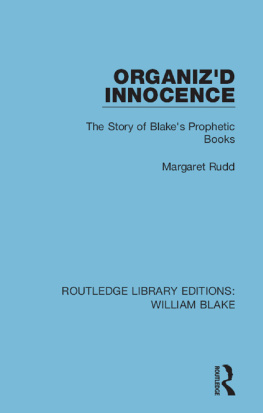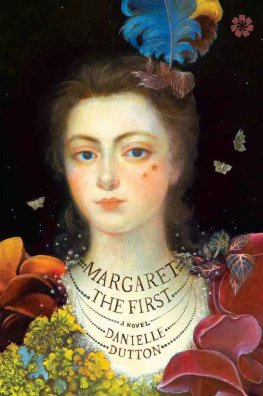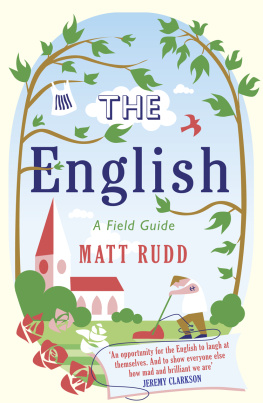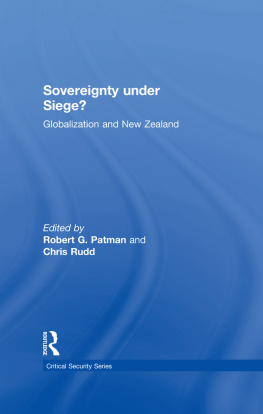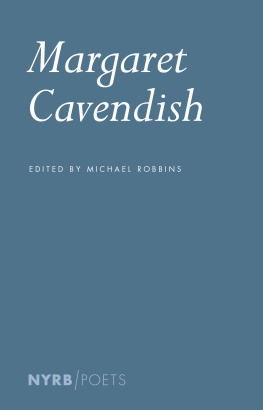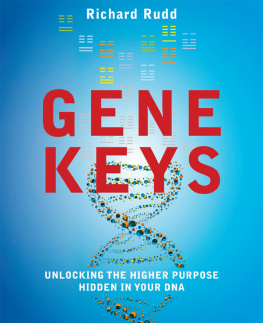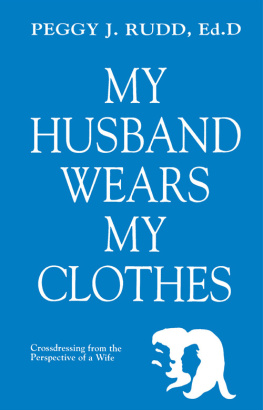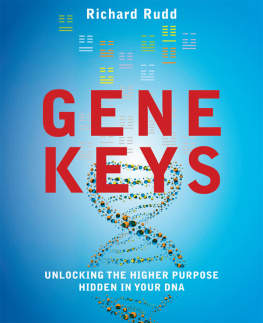Margaret Rudd E. - Organizd Innocence
Here you can read online Margaret Rudd E. - Organizd Innocence full text of the book (entire story) in english for free. Download pdf and epub, get meaning, cover and reviews about this ebook. year: 1956, publisher: TaylorFrancis, genre: Science. Description of the work, (preface) as well as reviews are available. Best literature library LitArk.com created for fans of good reading and offers a wide selection of genres:
Romance novel
Science fiction
Adventure
Detective
Science
History
Home and family
Prose
Art
Politics
Computer
Non-fiction
Religion
Business
Children
Humor
Choose a favorite category and find really read worthwhile books. Enjoy immersion in the world of imagination, feel the emotions of the characters or learn something new for yourself, make an fascinating discovery.
- Book:Organizd Innocence
- Author:
- Publisher:TaylorFrancis
- Genre:
- Year:1956
- Rating:4 / 5
- Favourites:Add to favourites
- Your mark:
- 80
- 1
- 2
- 3
- 4
- 5
Organizd Innocence: summary, description and annotation
We offer to read an annotation, description, summary or preface (depends on what the author of the book "Organizd Innocence" wrote himself). If you haven't found the necessary information about the book — write in the comments, we will try to find it.
Organizd Innocence — read online for free the complete book (whole text) full work
Below is the text of the book, divided by pages. System saving the place of the last page read, allows you to conveniently read the book "Organizd Innocence" online for free, without having to search again every time where you left off. Put a bookmark, and you can go to the page where you finished reading at any time.
Font size:
Interval:
Bookmark:

ROUTLEDGE LIBRARY EDITIONS: WILLIAM BLAKE
Volume 6
The Story of Blake's Prophetic Books
MARGARET RUDD

First published in 1956 by Routledge & Kegan Paul Ltd
This edition first published in 2016
by Routledge
2 Park Square, Milton Park, Abingdon, Oxon OX14 4RN
and by Routledge
711 Third Avenue, New York, NY 10017
Routledge is an imprint of the Taylor & Francis Group, an informa business
1956 Margaret Rudd
All rights reserved. No part of this book may be reprinted or reproduced or utilised in any form or by any electronic, mechanical, or other means, now known or hereafter invented, including photocopying and recording, or in any information storage or retrieval system, without permission in writing from the publishers.
Trademark notice: Product or corporate names may be trademarks or registered trademarks, and are used only for identification and explanation without intent to infringe.
British Library Cataloguing in Publication Data
A catalogue record for this book is available from the British Library
ISBN: 978-1-138-93813-7 (Set)
ISBN: 978-1-315-67509-1 (Set) (ebk)
ISBN: 978-1-138-93916-5 (Volume 6) (hbk)
ISBN: 978-1-315-67513-8 (Volume 6) (ebk)
DOI: 10.4324/9781315675138
Publishers Note
The publisher has gone to great lengths to ensure the quality of this reprint but points out that some imperfections in the original copies may be apparent.
Disclaimer
The publisher has made every effort to trace copyright holders and would welcome correspondence from those they have been unable to trace.
The Story of Blakes Prophetic Books
by
MARGARET RUDD

First published 1956
by Routledge & Kegan Paul Limited
Broadway House, Carter Lane, E.C.4
Made and printed in Great Britain
by William Clowes and Sons, Limited
London and Beccles
DOI: 10.4324/9781315675138
For
M.M.R.
J.H.R.
Unorganizd Innocence: An Impossibility.
Innocence dwells with Wisdom, but never with Ignorance.
Blake: note written on a page of The Four Zoas.
I would like to take this opportunity to say something about how this book came to be written. Its nature is in many ways unorthodox, and it may seem to lie rather confusingly in the area between formal scholarly criticism and a more creative form of writing, something like a biographical novel about how the troubles of Blakes life affected his strange poems known as the prophetic books.
Although entirely sympathetic to what they praise as exciting and original insight into the meaning of Blakes prophecies, my publishers are a little worried because I have refused to back up my interpretation with the usual heavy machinery of scholarshipthe extensive references to other critics, the digressions on possible esoteric sources and parallels, the lengthy footnotes on changes in the values of Blakes never static symbolsall, in fact, that I have deliberately left out or pruned away in order to reveal something that I hope is far more simple and human than any such display of erudition would convey.
The long poems known as the prophetic books tell, like all epics and myths, a very wonderful story about universal human events of the spirit. I believe that the primary value of the poems lies in this story, and that I would be foolish to let even scholarship in any way obscure the fine thread of Blakes tale as I attempt to unwind it. It is a thread that has many twists and knots of its own to untangle without adding further pedantic snarls.
I feel very strongly that such an explication as I am attempting should be kept as simple as possible and as free from all that is extraneous as can be managed. To my way of thinking, rather than erring on the side of too little formality and scholarly pretentiousness, my study is not nearly simple or colloquial enough.
There is no doubt at all in my mind that Blake meant The Four Zoas, Milton, and Jerusalem to form one long narrative, coherent only as a dynamic whole, and not simply, as Robert Hillyer put it, as a trove for lyric selection. It is the story of these three poems taken together that Blake must be talking about in the following much quoted passage from a letter to his friend, Butts, written in April of 1803. The story of Milton alone is much too short and slight to be compared to Homers epics or Paradise Lost.
None can know the Spiritual Acts of my three years Slumber on the banks of the Ocean, unless he has seen them in the Spirit, or unless he should read My long Poem descriptive of these Acts; for I have in these three years composed an immense number of verses on One Grand Theme, Similar to Homers Iliad or Miltons Paradise Lost.
Blakes earlier shorter prophecies, although often of great loveliness and significance, are only hints and forerunners of the last three poems, the prophetic books proper, with their One Grand Theme. It is this single Grand Theme and narrative that I am trying to follow through in this study.
The impetus for my interpretation of these poems came from an altogether different direction than the reading of Blake criticism, with the single exception of Middleton Murrys book on Blake. This is why I thought it unnecessary and even misleading to add a formal bibliography or list of books about Blake that I have learned from in the past, but did not once consult during the writing of my own book.
Blakes narrative or story, although rarely in itself lucid or simple, is a tale much more readily understandable to our psyche-conscious age than it would have been to Blakes own contemporaries. That this story of the prophetic books is Blakes own psychological drama I firmly believe, and have tried to point out the evidence for believing. However, I do not wish to labour overmuch this secondary point in my book, namely, the identification of Albion and Jerusalem with William and Catherine Blake, but rather simply to tell the story as it unfolds in the prophetic books, after briefly indicating in the first chapter why I believe the experience to be Blakes own. It would be a mistake to try to press an identification too hard, for always Blake widens out what is personal to universal significance if he succeeds, and simply to cosmic proportions when he fails, as in the equation of Hayley with Satan, and the soldier, Scofield, with a devil. Even Blakes removal from London to Felpham suffered a sea-change towards the eternal, although in this instance with great lyric charm. It may be a self-evident comment on the artistic process in general to underscore the idea that the experiences of Albion and Jerusalem may well be based on the experience of their creator, and it is not my primary point.
My awareness that a moving story of turbulent and disturbed emotion was the mainspring of the prophetic books, came long after I had first read them and set them aside with a rather smug sigh of relief that I had got through them at all. At that time their significance had not dawned upon me, and I agreed with most critics that one could have only the dimmest notion of what was going on in their turgid pages, and that the few passages of fine poetry should by all means be lifted out of their context in order to be understood.
Next pageFont size:
Interval:
Bookmark:
Similar books «Organizd Innocence»
Look at similar books to Organizd Innocence. We have selected literature similar in name and meaning in the hope of providing readers with more options to find new, interesting, not yet read works.
Discussion, reviews of the book Organizd Innocence and just readers' own opinions. Leave your comments, write what you think about the work, its meaning or the main characters. Specify what exactly you liked and what you didn't like, and why you think so.

